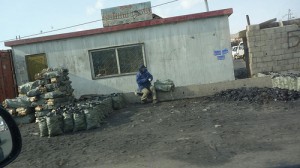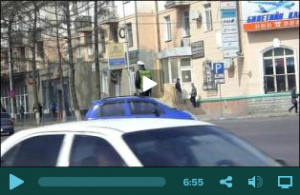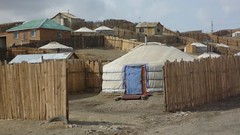 During my brief time in UlaanBaatar, I was recommended a contact person, Susan Griffeth, who had founded an organization working in the Ger (Yurt) district almost 10 years ago. Susan was kind enough to pick me up one afternoon and take me to the district and for a visit to her organization, Flourishing Future, to learn about all the community development and assistance activities they were involved in . From there another member of the FF team– Troy, who also helps run a travel agency (Rinky Dink Travel), led me on a tour of the area. During this walk he explains how things work or don’t work for the more than half a million people living in such neighborhoods in Mongolia’s capital city. The following is a 1 hour podcast of that adventure.
During my brief time in UlaanBaatar, I was recommended a contact person, Susan Griffeth, who had founded an organization working in the Ger (Yurt) district almost 10 years ago. Susan was kind enough to pick me up one afternoon and take me to the district and for a visit to her organization, Flourishing Future, to learn about all the community development and assistance activities they were involved in . From there another member of the FF team– Troy, who also helps run a travel agency (Rinky Dink Travel), led me on a tour of the area. During this walk he explains how things work or don’t work for the more than half a million people living in such neighborhoods in Mongolia’s capital city. The following is a 1 hour podcast of that adventure.
Tag Archives: Trans-Siberian
In 2010 I embarked on a one month journey to Siberia and Mongolia. During that time I taught new media at the University of Tomsk, and then traveled in the region, eventually getting on the Trans-Siberian and later the Trans-Mongolian express. These are the audio and video podcasts, as well my written entries from that journey.
ctrp336 Political Persecution and Mongolian History
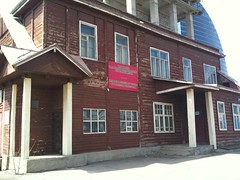 Within ten minutes of sitting down at a table together, Bekhbat and I immediately were immersed in a conversation about Mongolian history. Me, the student, and he – the teacher, Director of the Museum Dedicated to Victims of Political Persecution in UlaanBaatar, and the grandson of P. Genden; former Prime Minister of Mongolia and victim of political persecution, executed by Stalin’s KGB in 1937.
Within ten minutes of sitting down at a table together, Bekhbat and I immediately were immersed in a conversation about Mongolian history. Me, the student, and he – the teacher, Director of the Museum Dedicated to Victims of Political Persecution in UlaanBaatar, and the grandson of P. Genden; former Prime Minister of Mongolia and victim of political persecution, executed by Stalin’s KGB in 1937.
In this podcast conversation Bekhbat takes us through the history of modern Mongolia, sorting through the myths and half-truths and explaining how the country came to be what it is today. In doing so he also walks us through the history of his very interesting family, including the infamous story of how his grandfather got into a heated argument and slapped Stalin.
To the Ger District
I’m running late for my next appointment, and as I rush out of the Grand Khan Irish pub, I look across the sea of cars around Sukhbaatar square, and I cover my mouth with my scarf to try and filter the Coal and Carbon Monoxide filled air. The guide books say UlaanBaatar in winter has some of the worst air quality of any capital city in the world, yet somehow I’ve decided breathing through a scarf will make it all alright.
I know that Susan has been waiting for me for at least 20 minutes in front of the Pink Opera house, and in order to make it there, I’ve still got to negotiate at least two of the the very bizarre intersections that this city has to offer. Since many cars don’t find stop lights compelling enough to obey, I take a certain degree of comfort when I see that not only does this intersection feature traffic police trying to look tough in their sunglasses, but young Mongolians with fluorescent safety vests and mini stop signs. After a long delay, they swing out their arms and start waving the stop signs, in a few cases scolding cars that seem to almost run them down. I blow past the people walking at a normal speed, the tall westerner covered from head to toe in winter gear, using a scarf to cover most of his face and sunglasses to hide his eyes. 25 minutes- I zoom past the very small amount of people at Sukhbaatar Square, tourists perhaps, more people who like me, don’t mind showing up at the tail end of winter.
In front of the Pink Opera house, I find the blue SUV, and there inside is Susan, who to this point I have only spoken on the phone with once. After launching into several apologies, Susan immediately puts me at ease: “No problem. Actually, its nice when people are late, gives me a chance to have a little down time.” — Happy to have some downtime; I love Mongolia.
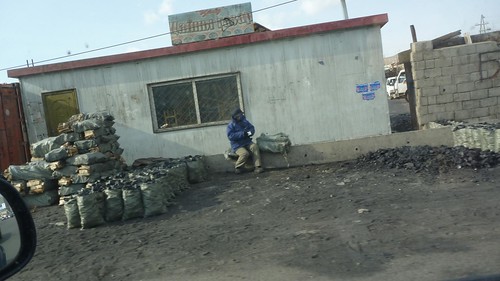
Susan is Project Manager for Flourishing Future*, a non governmental organization working in the Ger (The Mongolian tent many people call Yurts) District. On her business card is the phrase “Helping the Poorest of the Poor” in plain black letter type. Greetings and hello’s being concluded, off we ride through the city center and out to the western side of the city. We drive and talk, my eyes soaking in the rapidly changing cityscape, my mind soaking in the details of what is clearly a very interesting and knowledgeable person. As she explains her relationship to Mongolia, which is more than a decade old, my eyes scan each roadside shack selling bags and bags of coal, wood, car parts, and what I think was scrap metal. Every now and again we pass a line of donkey-pulled carts, waiting to haul heavy loads of wood which I don’t think you’re allowed to carry onto the bus. Susan seems to read the fact that I’m quite taken by what looks like such a different city to when we started, our conversation shifts to what is going on outside and the drunk man that has passed out just as he was crossing the street. Cars drive around him.
A slow left turn and we’re on a dirt road, or at least it seems to be a dirt road, with plenty of craters in it. Susan steers the car towards the side of the road as if we’re pulling over, she explains that we’re not pulling over, but in fact driving on the side of the road or off the road is sometimes smoother than staying on it. As we do this the occasional person walks by us in the opposite direction, unhindered by the potholes. This pseudo road is lined with fences that lead further and further up the mountain, and behind these fences I can see a few very small brick houses and a whole lot of the traditional Gers (or Yurts). It’s the first time I’m this close to this internationally known symbol of nomadic life in Mongolia, and just then it dawns on me-we’ve arrived in the Ger District.
*Link to Rinky Dink Travel, which is associated with Flourishing Future and also took the time to take me around the district.
bmtv111 The Trans-Mongolian Journey
The following is a video montage of my journey from Irkutsk, Russia to UlaanBaatar, Mongolia aboard the Moscow to Beijing Train. It also includes a few clips from my first day in the city of UlaanBaatar. For more video entries, including many that didn’t appear on this blog, from my Siberian journey, follow this link to my blip.tv videos.
ctrp335 At the Russia-Mongolia Border
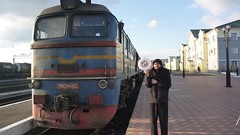 A short podcast from the Russia-Mongolia border. As it takes about 3 hours to clear Russian customs, and more than 1 hour to clear Mongolian customs, I decided to get out and record some observations and thoughts especially in regards to the first two weeks in Siberia. You’ll also hear me briefly interrupted by the arrival of a battalion of Russian border guards.
A short podcast from the Russia-Mongolia border. As it takes about 3 hours to clear Russian customs, and more than 1 hour to clear Mongolian customs, I decided to get out and record some observations and thoughts especially in regards to the first two weeks in Siberia. You’ll also hear me briefly interrupted by the arrival of a battalion of Russian border guards.
I Can Offer You a Job
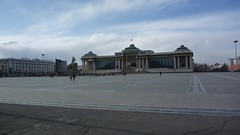 “I can offer you a job, you should stay longer; for many foreigners Mongolia is very interesting right now.”
“I can offer you a job, you should stay longer; for many foreigners Mongolia is very interesting right now.”
I tried hard to keep chewing my food, but in my head I was already calculating what life in UlaanBaatar would be like working for some government official. I quickly regained my focus, “Thank you, but I’m not seeking a job, I’ll return home tomorrow” I tell him, thanking him a few more times and trying to get back to the interview.
Bekhbat, grandson of P. Genden, the former Mongolian Prime Minister famous for having been the only man to slap Stalin, has a lot to tell me about Mongolia as we sit down for lunch at the Grand Khaan Irish pub. An extremely well spoken and modest gentleman, on his suit jacket lapel he wears a tiny pin that is familiar to me, rotary club. Among his many civil activities, he is an active member of the rotary club working hard to raise money for segments of the Mongolian population that fall through the cracks; the poor, the deaf, etc. It becomes clear that like his grandfather, Bekhbat is a man people know and trust. Even during the course of one lunch, there was rarely a 10 minute gap where someone (Mongolian or foreign) didn’t come up to him to shake his hand with a big smile.
“Mongolia will become a country the benefits from its extensive mineral wealth, like Venezuela or Russia, there will be a great influx of money and things here will improve.”
He goes on to talk about Copper, not only with Mongolia as a great source for Copper, but also that the nation would become a place where that Copper is processed as well. Uranium, with a great need in many nations for nuclear energy production, they will turn to Mongolia which has a great amount of it.
“My interest is public-private partnerships, to find the best way to improve Mongolia’s infrastructure.”
Indeed infrastructure is crying out for help in a nation where tap water is undrinkable and more than half the capital city, never mind the country, does not have running water or indoor plumbing. Where once you get outside the city limits of UlaanBaatar, you find roads almost non existent or un-drivable without the help of a very special 4 wheel drive vehicle. Say nothing of the nation’s primary energy source, coal, the exhaust from which creates a thick layer of pea-soup-like air that in the early winter morning if you open your mouth you almost choke on it.
~
Yes it was hard not to love Mongolia, where everyday I was there, with every passing hour, more adventures arose out of nowhere. Had I stayed another few days, there is no telling where I would ended up or who I would have found myself sitting with. Ready to come home? No, I was not.
Stay tuned for the podcasts…


